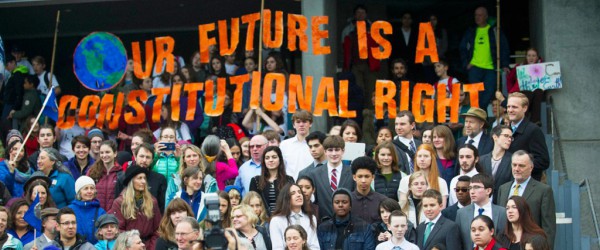
Children sue the government over climate change
Since the U.S. hasn’t been able to cut carbon emissions enough to rein in climate change—even President Obama’s Clean Power Plan, which would only partially help, is stuck in legal limbo—a group of children is suing the government to force action.
A federal judge in Oregon recently ruled that their case could move forward, after the government (and the fossil fuel industry, which inserted itself in the case) argued that it should be dismissed.
The group of 21 plaintiffs, age 8 to 19, saw a lawsuit as the best way to protect their future.
“Neither this Congress or this administration are prepared to take the difficult steps to achieve the climate targets that science requires,” says Philip Gregory, one of the attorneys for the plaintiffs. “Like the civil rights cases from the ’50s and ’60s when the school districts wouldn’t integrate the schools and Congress and the state legislatures wouldn’t pass legislation, children there turned to the courts. And here, these 21 kids turned to the courts because there really is no other place for them to go.”
Like the previous civil rights cases, this case argues that the children’s constitutional rights are being violated—for example, their right to equal protection under the Fifth Amendment, they say, is violated because they won’t have the same protections as previous generations, because the government has favored the short-term interests of certain citizens instead.
“We have a lot of evidence that the government has known since ’65, certainly by the late ’80s, that children are facing a life-threatening situation,” Gregory says. “When the government knows that and does nothing—or worse, what’s actually occurring, enables the life-threatening situation to get worse—then the law says that a citizen has a right to bring a constitutional claim against the government.”
Because the plaintiffs are too young to vote, that was another reason they saw a lawsuit as a useful option. They also wanted to demonstrate that this type of suit could be possible. “They’re showing other kids that the courts are a vehicle for grievances, particularly grievances of constitutional dimension, like the complaint we filed,” he says.
The nonprofit Our Children’s Trust, which brought the lawsuit, has also sued in every other state. But Oregon was the first to let a case move forward. The judge agreed that the children face a greater risk of harm than older generations:
The debate about climate change and its impact has been before various political bodies for some time now. Plaintiffs give this debate justiciability by asserting harms that befall or will befall them personally and to a greater extent than older segments of society. It may be that eventually the alleged harms, assuming the correctness of plaintiffs’ analysis of the impacts of global climate change, will befall all of us. But the intractability of the debates before Congress and state legislatures and the alleged valuing of short-term economic interest despite the cost to human life, necessitates a need for the courts to evaluate the constitutional parameters of the action or inaction taken by the government.
The judge agreed that the kids have standing to sue, even if they may not have yet been directly injured by climate change, because there’s science to back up the idea that harm is imminent.
Now, a district judge will review the first judge’s decision, and if she accepts it, the children and their lawyers will start the discovery process, finding out what the federal government knew about climate change, and when they knew it.
It’s unclear how far the lawsuit will get—as the judge writes in his opinion, it’s unprecedented. But Gregory argues that the legal theories have been used before, and it’s just that applying them to climate change is new.
“It wasn’t that the judge was going out on a limb,” he says. “It’s more that he is recognizing through his opinion that these other areas of the law can be applied to climate change, and if we could prove what we allege—and we genuinely believe that we can—then we will have a constitutional claim.”
To go to the original article click here.



















